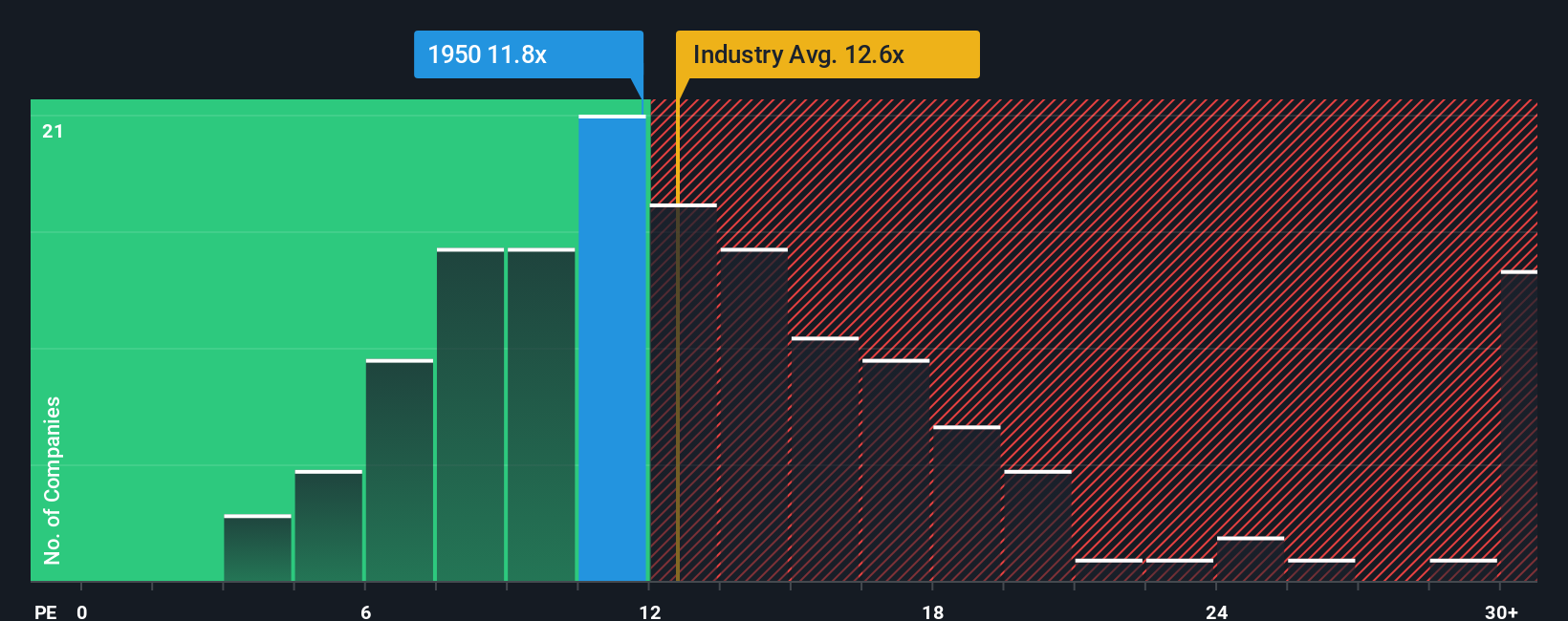- Japan
- /
- Construction
- /
- TSE:1950
Nippon Densetsu Kogyo Co., Ltd.'s (TSE:1950) Share Price Is Matching Sentiment Around Its Earnings
With a price-to-earnings (or "P/E") ratio of 11.8x Nippon Densetsu Kogyo Co., Ltd. (TSE:1950) may be sending bullish signals at the moment, given that almost half of all companies in Japan have P/E ratios greater than 15x and even P/E's higher than 23x are not unusual. Nonetheless, we'd need to dig a little deeper to determine if there is a rational basis for the reduced P/E.
Recent times have been advantageous for Nippon Densetsu Kogyo as its earnings have been rising faster than most other companies. One possibility is that the P/E is low because investors think this strong earnings performance might be less impressive moving forward. If you like the company, you'd be hoping this isn't the case so that you could potentially pick up some stock while it's out of favour.
Check out our latest analysis for Nippon Densetsu Kogyo

Does Growth Match The Low P/E?
The only time you'd be truly comfortable seeing a P/E as low as Nippon Densetsu Kogyo's is when the company's growth is on track to lag the market.
If we review the last year of earnings growth, the company posted a terrific increase of 36%. Pleasingly, EPS has also lifted 176% in aggregate from three years ago, thanks to the last 12 months of growth. Accordingly, shareholders would have probably welcomed those medium-term rates of earnings growth.
Looking ahead now, EPS is anticipated to climb by 1.8% per annum during the coming three years according to the one analyst following the company. With the market predicted to deliver 9.6% growth each year, the company is positioned for a weaker earnings result.
In light of this, it's understandable that Nippon Densetsu Kogyo's P/E sits below the majority of other companies. Apparently many shareholders weren't comfortable holding on while the company is potentially eyeing a less prosperous future.
What We Can Learn From Nippon Densetsu Kogyo's P/E?
Typically, we'd caution against reading too much into price-to-earnings ratios when settling on investment decisions, though it can reveal plenty about what other market participants think about the company.
We've established that Nippon Densetsu Kogyo maintains its low P/E on the weakness of its forecast growth being lower than the wider market, as expected. At this stage investors feel the potential for an improvement in earnings isn't great enough to justify a higher P/E ratio. Unless these conditions improve, they will continue to form a barrier for the share price around these levels.
Don't forget that there may be other risks. For instance, we've identified 1 warning sign for Nippon Densetsu Kogyo that you should be aware of.
If P/E ratios interest you, you may wish to see this free collection of other companies with strong earnings growth and low P/E ratios.
Valuation is complex, but we're here to simplify it.
Discover if Nippon Densetsu Kogyo might be undervalued or overvalued with our detailed analysis, featuring fair value estimates, potential risks, dividends, insider trades, and its financial condition.
Access Free AnalysisHave feedback on this article? Concerned about the content? Get in touch with us directly. Alternatively, email editorial-team (at) simplywallst.com.
This article by Simply Wall St is general in nature. We provide commentary based on historical data and analyst forecasts only using an unbiased methodology and our articles are not intended to be financial advice. It does not constitute a recommendation to buy or sell any stock, and does not take account of your objectives, or your financial situation. We aim to bring you long-term focused analysis driven by fundamental data. Note that our analysis may not factor in the latest price-sensitive company announcements or qualitative material. Simply Wall St has no position in any stocks mentioned.
About TSE:1950
Nippon Densetsu Kogyo
Engages in contracting electrical equipment construction work in Japan.
Solid track record with adequate balance sheet and pays a dividend.
Market Insights
Community Narratives



